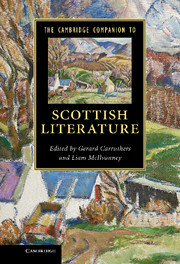Book contents
- Frontmatter
- Contents
- Notes on Contributors
- Acknowledgements
- Chronology
- Introduction
- 1 Scottish Literature before Scottish Literature
- 2 The Medieval Period
- 3 Reformation and Renaissance
- 4 The Aftermath of Union
- 5 Robert Burns
- 6 Enlightenment, Romanticism and the Scottish Canon
- 7 Scott and the Historical Novel
- 8 The Gaelic Tradition
- 9 Scottish Gothic
- 10 Victorian Scottish Literature
- 11 Robert Louis Stevenson
- 12 Hugh MacDiarmid and the Scottish Renaissance
- 13 Popular Fiction
- 14 Muriel Spark
- 15 The Glasgow Novel
- 16 ‘What is the language using us for?’
- 17 The Emergence of Scottish Studies
- 18 Otherworlds
- 19 Scottish Literature in Diaspora
- Index
- References
6 - Enlightenment, Romanticism and the Scottish Canon
Cosmopolites or Narrow Nationalists?
Published online by Cambridge University Press: 05 January 2013
- Frontmatter
- Contents
- Notes on Contributors
- Acknowledgements
- Chronology
- Introduction
- 1 Scottish Literature before Scottish Literature
- 2 The Medieval Period
- 3 Reformation and Renaissance
- 4 The Aftermath of Union
- 5 Robert Burns
- 6 Enlightenment, Romanticism and the Scottish Canon
- 7 Scott and the Historical Novel
- 8 The Gaelic Tradition
- 9 Scottish Gothic
- 10 Victorian Scottish Literature
- 11 Robert Louis Stevenson
- 12 Hugh MacDiarmid and the Scottish Renaissance
- 13 Popular Fiction
- 14 Muriel Spark
- 15 The Glasgow Novel
- 16 ‘What is the language using us for?’
- 17 The Emergence of Scottish Studies
- 18 Otherworlds
- 19 Scottish Literature in Diaspora
- Index
- References
Summary
The concept of a ‘Scottish literature’ by its very phrasing invokes a claim to be a national literature. A collection such as the present one accepts the existence of a ‘Scottish’ literature in these terms: distinct in important respects from any other literature, and having within it qualities which express, reflect or relate to a set of experiences which are sufficiently widely shared and expressive of certain collectivities of culture, institutions or banal quotidian association that we have come to call ‘national’. What the validity or otherwise of this term is is a different matter, which I have explored elsewhere. The chapter which follows is instead aimed at teasing out a question of periodicity and aesthetic in this national literary history: the extent to which ‘Scottish’ literature partakes of European and Western literary movements which are normally taken as transcending national boundaries, and the extent to which the Scottish case inflects these in distinctive ways in the Romantic period.
In the context of the long eighteenth century, this is an important question, because – in recent years in particular – Scotland has been seen as having a key role in the European Enlightenment. The Scottish Enlightenment has been treated as a key intellectual powerhouse, not least in the United States, where books such as Arthur Herman’s How the Scots Invented the Modern World: The True Story of How Western Europe’s Poorest Nation Created Our World and Everything in It (2004) present an extravagantly maximalist case for a national Enlightenment promoting the universal values of modern rationality while serving as the creative engine-room for the disciplines of modern thought and the achievements of modern technology. Closer to home, Alexander Broadie’s Cambridge Companion to the Scottish Enlightenment (2003) is currently the best-selling Cambridge Companion, and was published in Mandarin in 2010. The Scottish Enlightenment has a long and unquestioned national reach.
- Type
- Chapter
- Information
- The Cambridge Companion to Scottish Literature , pp. 86 - 102Publisher: Cambridge University PressPrint publication year: 2012



